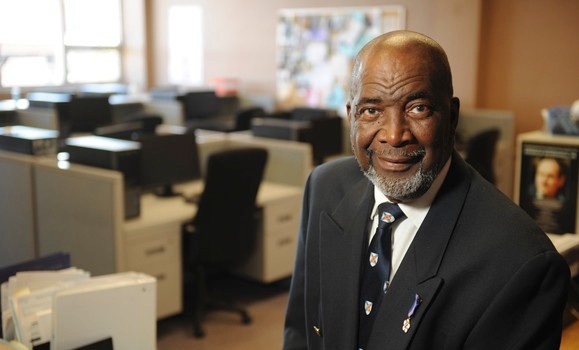News
» Go to news mainRemembering Rocky

Burnley "Rocky" Jones, beloved activist and human rights activate who passed away this week, helped establish Dal's Transition Year Program and the Indigenous Blacks and Mi'kmaq Initiative.
He was the man everyone called "Rocky"
Burnley "Rocky" Jones, a champion of education and a tireless advocate for social justice and human rights, passed away Monday at the age of 71. A ��ɫֱ�� alumnus, he was also an instrumental figure in the establishment of the university's Transition Year Program and the Indigenous Blacks and Mi'kmaq Initaitive.
"There are not words to capture the breadth, depth, passion and love inherent in [his] life lived," says Michelle Williams, director of the Indigenous Blacks & Mi'kmaq Initiative in the Schulich School of Law.
"[His] work to improve all of our lives, and to show us our own worth and dignity, cannot be measured. I see it every time a potential applicant contacts the IB&M Initiative and talks about how Mr. Jones encouraged them to call, to go to law school. I see it in the courageous acts of our many community and legal activists who stand on his shoulders, and continue the path he forged. He taught us by example to work hard, play hard and love life."
Born in Truro, Nova Scotia, Jones grew up as one of ten children, quickly learning the value of community support. His social activism began in the peace and civil rights movements of the 1960s, and through the years he became respected as a "fierce champion of racial equality and justice," as described when named to the Order of Nova Scotia in 2010. He was a founding member of The Black United Front of Nova Scotia, the National Black Coalition of Canada, the African Canadian Liberation Movement and the Nova Scotia Project and Kwacha House, to name a few.
Opening doors
In 1970, when he was an undergrad student, Jones, along with grad student James Walker, developed a university-level program aimed at black and aboriginal school dropouts. That became ��ɫֱ��'s Transition Year Program, which recently marked its 40th anniversary. More than 1,000 students have graduated from the program, many of them becoming leaders in the black and aboriginal communities.
"The Transition Year Program wouldn't exist without Rocky's advocacy, action and knowledge," says Patricia Doyle-Bedwell, the current director of the program. "He fought hard for equity and justice. He knocked down the walls of exclusion and opened the doors for all of us."
In 1988, in the midst of the Donald Marshall Junior Inquiry, Jones put forward the idea that increasing representation of Indigenous Blacks and Mi'kmaq in the legal profession was one way of reducing discrimination and remedying systemic failures of the criminal justice system. Jones was central to the efforts that led to the creation of the Indigenous Blacks and Mi'kmaq Programme (now known as the Indigenous Blacks and Mi'kmaq Initiative) at the law school in 1989.
As he was actively recruiting applicants for the new program, he was encouraged by the community to send in his own application. He was accepted as one of the first members of the program in 1989 and was chosen as the class valedictorian when he graduated in 1992. He stayed part of the Dal community after graduation by working with ��ɫֱ�� Legal Aid Service before starting his own firm, B A "Rocky" Jones & Associates. Soon after he was called to the Bar, he took on what would be one of his most famous cases as a lawyer – the groundbreaking R v RDS, which set a precedent for race-related litigation and contextualized judging.
Among Jones' many honours were the Order of Nova Scotia, an honorary degree from Guelph University and the H Carl Goldenberg, CQ and Honourable GI Smith Trust Awards from the Schulich School of Law.
"A champion of social justice"
Afua Cooper, the James R. Johnston Chair in Black Canadian Studies, says Jones was "a champion of social justice and the Black struggle."
"Rocky has contributed to the local, national, and international struggle for Black rights," she says. "Over these past two years [as Chair] I have had the great pleasure to work with Dr. Jones. He exemplified compassion, strength, dedication, devotion, and commitment."
Kim Brooks, dean of the Schulich School of Law, first met Jones at a meeting of social justice advocates in Ottawa in the mid-1990s.
"Rocky was an eloquent speaker — fierce, brave, smart," she says. "It was clear that he was loved and admired, and possibly was even revered, by those at the meeting. I thought to myself: here is a man I want to know more about. It was one of the great joys of finding my way to Halifax: having the chance to get to know Rocky a little bit better."
Recent News
- Professor Emeritus Wayne MacKay ft in "Legal columnist Wayne MacKay looks at tough‑on‑crime campaign promises"
- Professor Emeritus Wayne MacKay ft in "A closer look at "tough on crime""
- Associate Professor Naiomi Metallic ft in "Opinion: Indigenous issues absent in federal election"
- ��ɫֱ�� Legal Aid Service ft in "��ɫֱ�� Legal Aid urges vigilance as stricter deadlines for tenants are put in place"
- Professor Matthew Herder ft in "Canadians could lose vital safety information amid deep cuts to the U.S. FDA, experts warn"
- Professor Kim Brooks ft in "Opinion: Trump’s freeze on national research funding an in for Canada"
- Associate Professor Michael Karanicolas ft in "Lawyers say Advocates' Society needs reform after org cancels event amid keynote speaker backlash"
- Professor Emeritus Wayne MacKay ft in "Nova Scotia moving to modernize traffic safety protocols"
